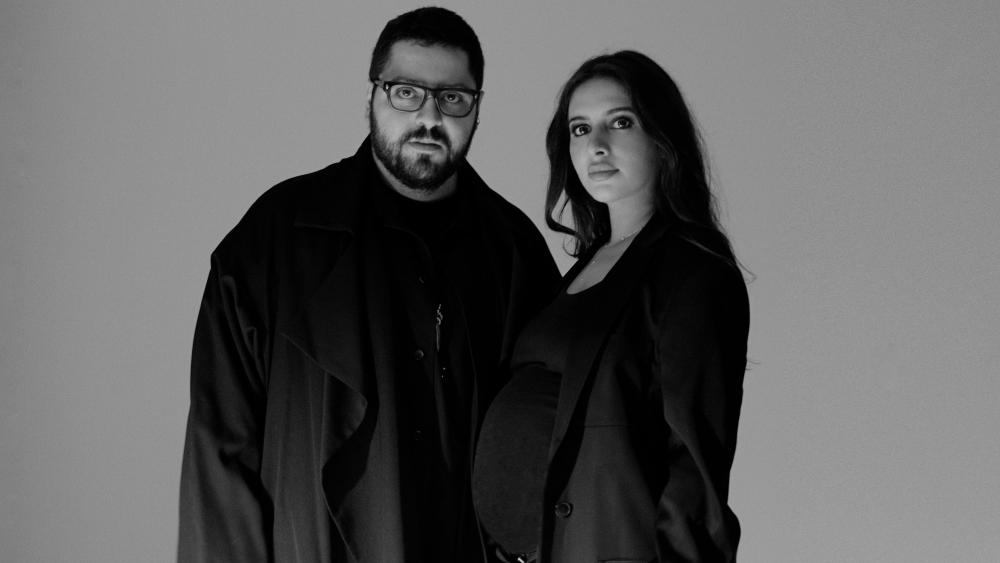In a corner of Dubai Mall, young creatives gather around a turntable spinning vinyl from Bünyamin Aydin’s personal collection. The scene could be mistaken for a trendy concept store in London or New York, but this is Les Benjamins’ newest flagship — where marble walls etched with traditional patterns meet contemporary streetwear, and where Middle Eastern youth are finding their cultural voice in an increasingly globalized world.
Born from the creative vision of Turkish-German designer Bünyamin Aydin and his Saudi wife, Lamia AlOtaishan Aydin, Les Benjamins has emerged as more than just a streetwear label — it’s becoming a cultural movement that’s reshaping how Middle Eastern youth see themselves in the contemporary fashion narrative. The Istanbul-based brand is crafting a language that speaks directly to a generation caught between tradition and modernity, while also building an influential roster of collaborators and supporters ranging from Travis Scott to Daniel Arsham, Hugo and Nike to Apple.
“We’re not from Paris or New York or Tokyo,” Bünyamin Aydin reflected. “But that’s what makes our story so exciting. We want to shine a light on our region and show the world the richness of our culture and how diverse it is.”
Bünyamin Aydin and Lamia AlOtaishan Aydin’s own cross-cultural relationship serves as the foundation for this ethos. The two met several years ago, bonding over their shared experiences as creatives from the East and West. “It’s a perfect blend,” Bünyamin Aydin said. “Lamia being Saudi and me being Turkish-German — it just works.”
With 14 stores worldwide, five more in the pipeline for 2025, and a global stockist list of 60 retailers across 20 countries, Les Benjamins’ mission to celebrate underrepresented stories from the Middle East is resonating. “There wasn’t a platform to make self-expression here cool and allow the youth to celebrate their identity,” said Aydin, who founded the brand in 2011. “There was no brand that embraced our identity — it’s always been a collaboration from the West with a capsule collection in the East. With Les Benjamins, we want to go much deeper.”
AlOtaishan Aydin, who met Aydin after she discovered the brand on her own quest for unique pieces, echoed this sentiment, noting the importance of authenticity. “The brand is about providing a space for people from our region, specifically young kids, to be proud of where they come from. These are our stories, and they’re coming directly from people like us,” she said.
Les Benjamins’ latest expansion, a Dubai Mall flagship that opened this summer, is centered around storytelling. Designed by architect Dong-Ping Wong of Food New York, the interiors feature stainless steel panels etched with marble patterns inspired by Istanbul’s Hagia Sophia. “It’s Istanbul meets Dubai — a melting pot of cultures and celebration of identity, both historical and modern,” Aydin explained, citing his deep connection to both cities. “The space, we hope, evokes a sense of nostalgic futurism.”
Aydin and AlOtaishan Aydin said they aimed to create a retail experience that goes beyond shopping, where visitors can immerse themselves in a curated blend of fashion, art, music and architecture. From their vibrant, community-driven events — think pizza parties and chicken kebab fests — to their thoughtfully designed retail spaces, the brand aims to be a hub and platform for fashion and culture enthusiasts to celebrate and share experiences with a distinct Middle Eastern sensibility.
A look from Les Benjamins’ latest collection.
The boutique features the brand’s most recent collections, including one called “Kismet Voyage East to West,” alongside the Les Benjamins x Anuar Khalifi collection, a collaboration with the Spanish Moroccan artist that pays homage to the Arab diaspora and the theme of immigration.
The store also carries the popular Hugo collaboration, a milestone moment for Aydin because it was a tribute to his own personal family story, his grandparents’ journey as Turkish guest workers who immigrated to Germany in the 1960s.
“I think it was the first time a German fashion house had an immigrant design a collection,” he said proudly. “The looks reflect the migrant experience — from the tailored suits they wore, to the workwear they had to don, and the emerging Turkish hip-hop scene inspired by American soldiers.”

AlOtaishan Aydin, who recently gave birth to the couple’s first child, Zayn, has led Les Benjamins expansion into new categories, including leather goods, women’s bags, eyewear and fragrances. All of these categories reflect the brand’s ethos, said AlOtaishan Aydin. “It’s about representation and celebrating our authentic identity. That’s what sets us apart and what our community connects with so deeply.”
As the brand continues to expand its physical footprint, Aydin and AlOtaishan Aydin have their sights set on new markets. “Our strategy is focused on the Near East, Middle East, and Far East, in combination with the West,” Aydin said.
Saudi Arabia has emerged as an increasingly important market for Les Benjamins, reflecting the rapid transformation underway in the kingdom and burgeoning youth population. “Saudi is like a second home for the brand,” said AlOtaishan Aydin, who grew up in Riyadh. “We’ve done so many events there and have a loyal customer base that has been with us since the early days.”
The duo also spends significant time in Japan and South Korea, laying the groundwork for growing the brand farther east. “The long-term vision is the Far East,” Aydin said. “But we’re also really excited about Saudi Arabia and open more in the Gulf region — it’s a priority for us to find the right space to enter those markets.”

